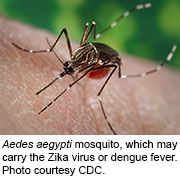One advisory: Don’t make travel to endemic areas mandatory for employees
FRIDAY, April 22, 2016 (HealthDay News) — Summer, mosquito season, and the threat of Zika virus transmission is approaching, and federal health experts on Friday issued guidelines to help protect American workers from infection.
To help minimize the danger, the U.S. Centers for Disease Control and Prevention and the Occupational Safety and Health Administration on Friday advised that businesses implement safeguards for workers. Many are the same as for the population generally: Reduce levels of standing water (where mosquitoes can breed); provide workers with insect repellent; and advise employees to wear long pants, long sleeves, and hats (including anti-mosquito netting if deemed necessary). But there were other advisories specific to business. “If requested by a worker, consider reassigning workers who indicate they are or may become pregnant, or male workers who have a sexual partner who is or may become pregnant, to indoor tasks to reduce their risk of mosquito bites,” the CDC said in a media statement.
As for travel protocols, “employers should consider allowing flexibility in required travel to areas with active Zika transmission for workers who are concerned about Zika virus exposure,” the agency said. Again, this is especially important for women who are or may become pregnant, or men with sexual partners who may become pregnant. “Even if they do not feel sick, travelers returning to the United States from an area with Zika should take steps to prevent mosquito bites for three weeks so they do not pass Zika to mosquitoes that could spread the virus to other people,” the CDC said.
On Friday, the CDC reported that as of April 20, 388 cases of travel-linked Zika virus disease have been confirmed in the 50 states, and so far no American has picked up the disease locally. Thirty-three of the cases occurred during a pregnancy and eight were thought to be sexually transmitted.
Copyright © 2016 HealthDay. All rights reserved.








